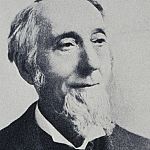Charles Anthony Schott facts for kids
Quick facts for kids
Charles Anthony Schott
|
|
|---|---|

Charles Anthony Schott
|
Charles Anthony Schott was a German-American scientist. He was born on August 7, 1826, in Mannheim, Germany. He passed away on July 31, 1901, in Washington, D.C..
Early Life and Education
Charles Anthony Schott grew up in Mannheim, Germany. In 1847, he finished his studies at the Polytechnic School in Karlsruhe. This school was like a technical university.
The next year, in 1848, he moved to America. He soon started working for the Coast and Geodetic Survey. This government agency studies the Earth's shape and its features. In 1853, he became an American citizen. By 1856, he was promoted to an assistant in the service.
Important Scientific Work
Mr. Schott was a very active scientist. He helped observe two total eclipses of the sun. One was in August 1869, in Springfield, Illinois. The other was in December 1870, in Catania, Sicily. Observing eclipses helps scientists learn more about the sun and Earth.
In 1898, he traveled to Bristol, England. There, he was a representative at the International Conference on Terrestrial Magnetism. This meeting brought together scientists from around the world. They discussed the Earth's magnetic field.
Contributions and Recognition
Charles Anthony Schott was a member of many important scientific groups. These included the American Philosophical Society (starting in 1863). He was also part of the National Academy of Sciences. This is a very respected group of scientists in the United States. Other groups he joined were the Washington Academy of Sciences and the American Association for the Advancement of Science.
He wrote many scientific papers. His writings covered topics like hydrography (mapping water), geodesy (measuring the Earth), tides, and meteorology (weather). He also wrote about the physics of the globe. Many of his papers were published by the Smithsonian Institution.
The French Academy gave him a special medal. This was their highest honor. They recognized his important research on terrestrial magnetism. This shows how valuable his work was to the scientific community.
 | Valerie Thomas |
 | Frederick McKinley Jones |
 | George Edward Alcorn Jr. |
 | Thomas Mensah |

